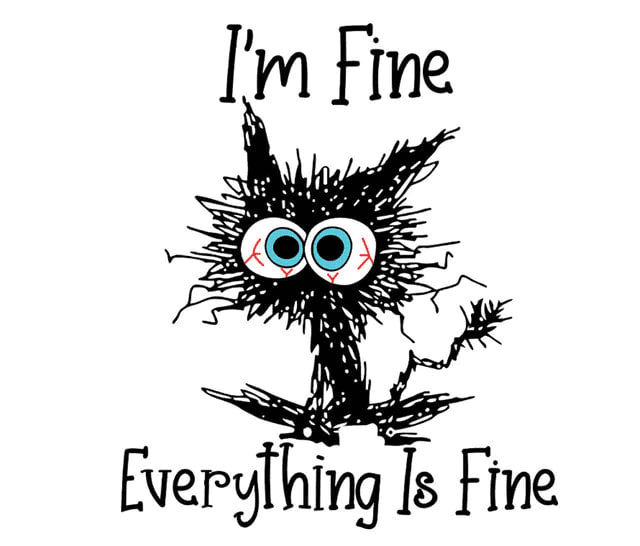CBD for Cat Anxiety: All-Natural Solution for Your Aggressive Cat

Taking care of your beloved kitten can be tough, especially when they're stressed and scared and it messes things up at home. Fear is a normal emotional response when we’re in danger, but if an imagined threat consistently triggers the fear response, it can turn into an anxiety disorder.
Anxiety can overwhelm both cats and humans, and if you want to prevent or treat it, it's vital to understand what actually causes it.
When cats are fearful and/or anxious, the root cause is usually their experiences. There are many prescription medications to help them, but some debilitating side effects usually accompany the relief.
A lot of cat owners opt for natural remedies as their preferred choice because of their gentle, non-invasive nature.
Certain herbs can have a calming effect on cats, but many pet owners are turning to the 'full-spectrum of health benefits of cannabidiol (CBD).
CBD leverages the endocannabinoid system (ECS) found in all mammals, including cats, to bring their body and mind into harmony.
This system and its receptors are present throughout every major system of the body. CBD from plants act in a similar way to the body's natural cannabinoids.
What is Cat Anxiety and Feline Fear?

Fear is the normal emotional, and to a great extent, biological response to danger that prepares the body with fight-or-flight reactions, while anxiety is a state of uneasiness in the expectation of potential danger.
When we, or cats, feel anxious, our bodies instinctively prepare for fight-or-flight, resulting in a pounding heart and a rush of adrenaline.
We know it as the “fight or flight (or freeze)” response and it is a vital aspect of what maintains humans and animals safe from harm.
Wild cats instinctively use this response to stay safe, but domestic cats, who don't experience the same level of danger, may not shake off this instinctual reaction as quickly.
That is to say - when an imagined danger/s consistently sets off this fear, it becomes an anxiety disorder. Which can have a substantial negative impact on hindering a cat’s ability to live a normal, happy life.
Severe anxiety disorders in cats can be devastating, but thankfully, there are natural remedies to ease their distress.
Feline Fear and Anxiety-Related Problems
Here are some anxieties cats commonly experience:
Phobias
Phobia means an intense, sometimes paralyzing, fear of external stimuli such as a loud crack of thunder, flashes of loud & bright fireworks, whirling of vacuum cleaners, etc.
A cat will display an immediately excessive response and totally lose it in a phobic situation.
Once a cat establishes a phobia of an event, the mere thought of it is enough to induce anxiety and panic.
Panic
Panic is a sudden paralyzing sensation that takes over a cat’s senses with a sharp, stifling silence. Akin to phobias, making a cat actively attempt to escape a situation with all their might. They may even act ‘vicious’ in order to escape, but underneath their aggressiveness is a deep sense of fear.
Cats can recall the sights, sounds, and feelings of fear with intense clarity.
Generalized Anxiety Disorder (GAD)
Generalized anxiety is a fear of multiple things. This can manifest itself in cats as general nervousness which appears to have no specific trigger.
A cat with GAD can display anxious symptoms no matter the situation. To the owner, a cat with GAD may always seem unenthusiastic, unhappy, or downright miserable.
However, this is how the cat displays or deals with its constant anxious feelings.
Separation Anxiety in Cats

Separation anxiety is another type of anxiety in cats. Cat separation anxiety is a condition where they display their angst, and anxiety when they are separated from their owners.
While separation anxiety is not as prevalent as it is in dogs, it is still not uncommon in cats.
Philosophers are still trying to make sense of this, why a dog in your home considers you their master and king, but cats believe they’re the ruling sovereign and you the subject. But who really knows.
When a cat’s bond with their human gets messed up, separation anxiety can become severe. Which can lead to all sorts of behavioral problems.
The cat may also become very clingy, constantly purring and following its owner around the house just to get some love.
A cat with separation anxiety can become distressed and agitated when the owner is leaving or preparing to leave.
Natural remedies for anxious cats, like CBD oil, may help them cope with separation anxiety before it takes hold and reduce its onset.
Triggers for Fear and Anxiety
Cats can often become fearful and anxious around other cats, large animals like dogs, loud noises, new or unfamiliar objects, places, and people - especially those who are not a part of their regular life.
When cats sense triggers associated with fear and anxiety, they may instinctually respond with physical behaviors to show their emotional state and ‘protect’ themselves, as they would in the wild.
How You Can Recognize Anxiety In Your Cat?
Most of us can recognize obvious signs of fear in humans – dilated pupils, a tense and crouched body, curling inwards and possibly a desire to get away quickly.
Unfortunately, a cat cannot tell us he is feeling anxious and cat owners may miss signs if there are no obvious triggers.
However, a cat displays some noticeable physical and behavioral signs of anxiety. Here are some of the most common symptoms of cat anxiety:
Behavioral Signs of Anxiety In Cats
- Excessive grooming - Grooming is how your cat keeps itself clean, but excessive grooming can have many negative effects because of a cat’s rough tongue, they can lose hair from their fur and sometimes use their teeth to remove fur tangles.
- Hiding away or increased clinginess - Your cat is frequently hiding and avoiding contact, or clinging to you like a scared little kitten.
-
Aggression - Your cat is hissing, growling and scratching more than usual, this includes furniture or carpet scratching.
- Restlessness - Your cat is more ‘jumpy’ and constantly scanning each corner of the premises for threats.
- Increased vigilance - Your cat is constantly pacing back and forth, unable to sit still.
- Soiling around the house - Your cat suddenly starts avoiding the litter box.
- Excessive meowing - Excessive vocalizing can also be a way for your cat to express its anxious feelings.
Physical Signs of Anxiety In Cats
- Increased sleepiness - Oversleeping, insomnia, or interrupted sleep which is a deviation from their usual sleeping pattern.
- Increased lethargy - Changes in energy levels can also be an alarm that your cat is not feeling at its best.
- Vomiting or diarrhea - Stress and anxiety can manifest as digestive issues many times.
- Loss of appetite - Cats may experience loss of appetite and weight because of anxiety, but some cats can also gain weight and start eating more.
What is Cannabidiol (CBD) for Cat Anxiety?
Pet owners are turning to hemp plants and their natural compound, CBD, for its potential therapeutic benefits that may help reduce anxiety in pets.
Cannabidiol (CBD) is a non-psychoactive part of hemp plants that interacts with the endocannabinoid system (ECS) of both humans and cats.
Cells of the amygdala contain receptors for this system, allowing for the regulation of emotions such as safety and calm.
Other Natural Remedies for Nervous Cats
When it comes to treating fear and anxiety in cats, to treat fear and anxiety in cats, natural options are a good place to start before going to meds.
Practices like environmental enrichment through playtime or interactive toys can help to increase stimulation - logical and instinctual - as well as provide outlets for natural behaviors such as chasing after prey (like many cat toys resemble).
Calming Practices for Cats
-
Environmental Enrichment
A great way to reduce stress in cats is to offer them an array of toys that they can explore with their claws, such as a scratching post or a toy filled with catnip. - More Playtime

Stimulate your cat with toys that will get them chasing; the feel of the toy in their paws will have them running around and satisfy their instinct for hunting.
Food puzzle toys and even trick training are excellent forms of mental stimulation.
Petting sessions where cat owners follow the cat's lead can also promote feelings of safety and calmness.
For an extra boost of relaxation you can also consider products containing cannabidiol (CBD) that interact with the endocannabinoid system (ECS) in all mammals – including cats – which plays a big role in controlling positive emotions like feeling safe and calm.
Can CBD Help Calm Anxiety in Cats?
CBD has been found to have a calming effect on cats. It works by interacting with the endocannabinoid system (ECS) in the body of all mammals, including cats.
This system and its receptors are present in every major system of the body. CBD from plants mimic the body’s natural cannabinoids.
The ECS works by sending “messages” from one part of the body to another via endocannabinoids like anandamide (AEA).
When CBD binds to CB1/CB2 receptors found on cells in areas like the amygdala – where fear or anxiety originate – it stimulates those receptors with enough force to generate positive emotional responses throughout the body.
What to Look for in CBD Oil for Cat Anxiety
When looking for CBD products for cats, it is important to look for products that are specifically designed for pets. It is also important to look for products that are made with high-quality ingredients and are free of contaminants.
It is important to look for products that are third-party tested to ensure they are safe and effective.
Aand…cats being cats, it must taste delicious. Natural, healthy ingredients like CBD with Wild Alaskan Salmon Oil can be a treat which cats cannot get their paws away from.
CBD Dosing For Cats

When it comes to dosing CBD oil for cats, it is important to start with the recommended dose and increase gradually as and if needed.
Natural Remedies for Nervous Cats
Additionally, calming practices can be beneficial such as engaging in petting sessions with your cat on its own terms with no attempts made to scare or startle them.
What to Look for in CBD Products for Cats - they may use lower concentrations of CBD oil than those made with humans in mind.
Wrap Up
Fear and anxiety can take a toll on both cats and their owners alike; it's important to know the common trigger of this issue so you can attempt to prevent it from occurring in the first place.
If you suspect your cat has an anxiety disorder, consider natural options like CBD before turning to pharmaceuticals.










